|\ Vera Mukhina's ART of STONE MONUMENTS /|
||| FLUX LoRA ||| By SilverAgePoets.com |||
For generating stylized images reminiscent of sculptures & stone monuments by Vera Mukhina.
Our Low-Rank Adapter (LoRA) for FLUX models fine-tuned on a broad selection (about 40) of photos taken across many decades (c.1910s–c.2010s) capturing a wide range of sculptures (ranging in scale from miniatures to enormous monuments) crafted, inspired, and/or designed by ...
The epochal Latvian-Russian-Soviet or, in short, World artist, sculptor, and monumentalist:
Vera Mukhina (1889 — 1953),
Vera Mukhina, the sculptor, holds her head in contemplation:
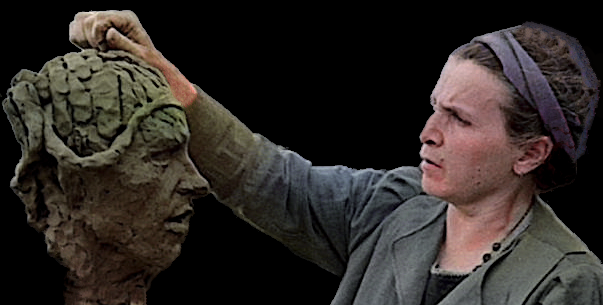
This Variant of our Soviet Monuments Style LoRA was fine-tuned over a De-Distilled Version of FLUX.

- Prompt
- Mukhina style photo of Once this lone wolf, transformed to stone, forever stands, sculpture by Vera Mukhina

- Prompt
- Mukhina style photo of a complexly dramatic sculpture monument scene enacted by an avant-garde trio representing two rebelling proletarians, a young androgynous revolutionary sailor on the left and a Ukrainian Bolshevik cossack on the right. They are tying up and capturing a third: a flabby malicious fanged top-hatted monster whose name is "Capital": title text atop. The sculpture features a refined, modern design with playful and imaginative forms. Elaborate intricate fine details. Detailed realistic textures. Raw blemished textured surfaces and unpolished materials. Title text reads: “Capital"

- Prompt
- Mukhina style sculpture by Vera Mukhina, of revolutionary workers led by Alexandra Kollontai and Angela Davis celebrating the toppling of capitalist empires, sculpture by Vera Mukhina

- Prompt
- Mukhina style sculpture by Vera Mukhina, of revolutionary workers led by Alexandra Kollontai and Angela Davis celebrating the toppling of capitalist empires, sculpture by Vera Mukhina

- Prompt
- Mukhina style sculpture by Vera Mukhina, of a revolutionary worker and Alexandra Kollontai side by side celebrating the toppling of capitalist empires, sculpture by Vera Mukhina

- Prompt
- Mukhina style sculpture by Vera Mukhina, of revolutionary workers led by Alexandra Kollontai and Angela Davis celebrating the toppling of capitalist empires, sculpture by Vera Mukhina
Trigger words
You should use Mukhina style photo of a sculpture or Vera Mukhina style photo of a stone monument to summon the artist's latent chisel.
Sculpture of a peasant woman, designed & sculpted by Mukhina during the 1920s:
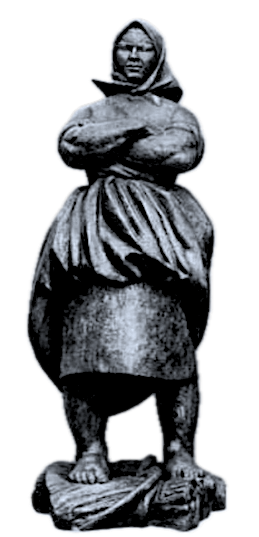
One of the 20th century's most accomplished, versatile, celebrated, and era-defining sculptors...
Who is best known, both across the Soviet regions and internationally, for her enormously iconic & sized figurative monument "The Worker Man & the Kolkhoz Woman".
Initially designed & created by Mukhika for the 1937 Exposition Internationale in Paris, "The Worker Man & the Kolkhoz Woman" arose at the side of the Eiffel Tower like two commensurably-sized sentries about to climb atop the metallic lattice, and perched atop, to proudly flaunt their hammer & sickle unto the whole wide world.
Unsurprisingly, the sculpture consolidated unto itself much of the Expo's attention that year, inspiring near-universal acclaim & awe, & drawing the eyes of the World. Who could resist the sublime grandeur of that pair of beautiful Soviet giants, stood tall against the backdrop of violet Parisian skies (paraphrasing a smitten Picasso)?!
The sculpture seemed to proclaim the full maturation and arrival of the first young generation reared in the USSR, and who held neither memories nor ethical residue of the rotten pre-Revolutionary empire.
Mukhina's "The Worker Man & the Kolkhoz Woman" monument, via 1937 postcard:

Meanwhile, back in the USSR that year, all the tragically tense, desperately narrow-zealed, and self-vulgarizingly triumphant top Stalinist apparatchiks & opportunists had gotten busy systematically erasing the last, as it seemed to them, vestiges of the Old World: their own friends & comrades (or/and desk/podium competitors), as well as (not so infrequently) themselves, under all sorts of direct & indirect pretexts.
Though on the level of individuals and specific cases, there was a vast diversity of varied motivations underlying how and why this or that local party administrator or police investigator or political trial judge or jury or NKVD agent or newspaper editor or casual informant (etc...) contributed and facilitated the purges, across all these disparate acts of peer-dooming ran certain oddly coherent subtexts.
Every purge (and not just in Soviet history) has such subtexts, and they can also be very different from context to context.
In any case, though Politburo or the General Secretary Stalin did not themselves look into or had much of a say regarding most of the names on the execution lists, what they initiated and informed was exactly this subtext, the hidden logic of the proceedings, complete with a very specific, if counterintuitive, prime target.
Which group or demographic did they target? Well, in '37/'38's bloodiest and most inhumane (and exponentially so) of all the Stalinist purges, the prime target were former and current Leftist-leaning intellectuals/activists.
It seems that following many prefigurations, the Stalinist machine had finally and collectively burst full wild under the long dialectic strain of hope and paranoia into a murderous and self-destructive psychosis...
What drew them to mark many of those once closest to them with those monstrous designator tags of an ultimate superfluousness, rendering them primed for torrents of every kind of bewilderingly libelous improvisations (meaning, accusations) from all sides?!
And so many were marked from the get-go for elimination... And for the large part, annihilated in the purges that year was anyone who had been in any way politically active in the late 1910s and early 1920s, mainly lifelong Bolsheviks. Other groups were swept up into the grinder alongside them, but more often than not by proxy/inertia.
In effect, in 1937 & 1938 there took place in the USSR a veiled (and to this day, mis-categorized) anti-Communist genocide orchestrated by Communists, and which resulted in the violent elimination of 90% of surviving Communists & Socialists active before and during the Revolution, and/or influential in the 1920s.
Alongside them were eliminated most Civil War-era Red Army veteran officers. Why? One theory is horrifyingly simple: to make way for the young. And if by 1940 there were still a few mentors around for these youths to turn to, it just so happened that very few of those mentors had ever read Marx's Das Kapital.
Soviet youth, via another sculpture by Mukhina:
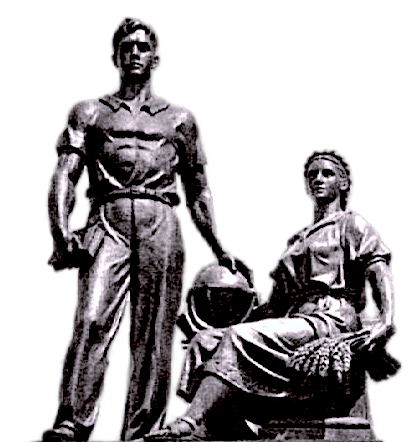
Remarkably, the purges were very effectively hidden or obscured from the young, many of whom remained oblivious until the 1950s. But then again, were they not so oblivious, they might have lost the War.
As it was, the War against invading fascists was won; yet, from among those youths, the first young Soviet generation for the sake of whose futurous integrity the Bolsheviks self-annihilated, more than half would perish in it.
Future is never built through or from wars. Sometimes it can be very narrowly safeguarded, given low enough casualties. But mostly, it is massacred, no matter who wins.
And furthermore, among those survivors left relatively undebilitated physically or/and mentally, many would become profoudly shocked, demoralized unto apathy or apolitization or alcoholism following the 1954/1955 revelation of the true scale and scope of 1930s purges...
And though the USSR as such survived for the approximate span of that first generation's healthiest and luckiest representatives (while the median lifetimes all across the USSR grew nearly two-fold, and population as a whole ballooned post-war); yet, in many ways the founding hope of the USSR was by 1956 already largely extinguished.
Now, what had remained, after these histories unrolled, suffocating beneath their wheels a great hope, and so many of the lives who should have and could have been true foundations for that Revolution's hard-won home?
Much had remained! And among it all still stands one of this hope's prime symbols, and a key artistic legacy of the USSR: "The Worker Man & the Kolkhoz Woman", alongside other monuments designed by Vera Mukhina.
Mukhina's "The Worker Man & the Kolkhoz Woman" today:
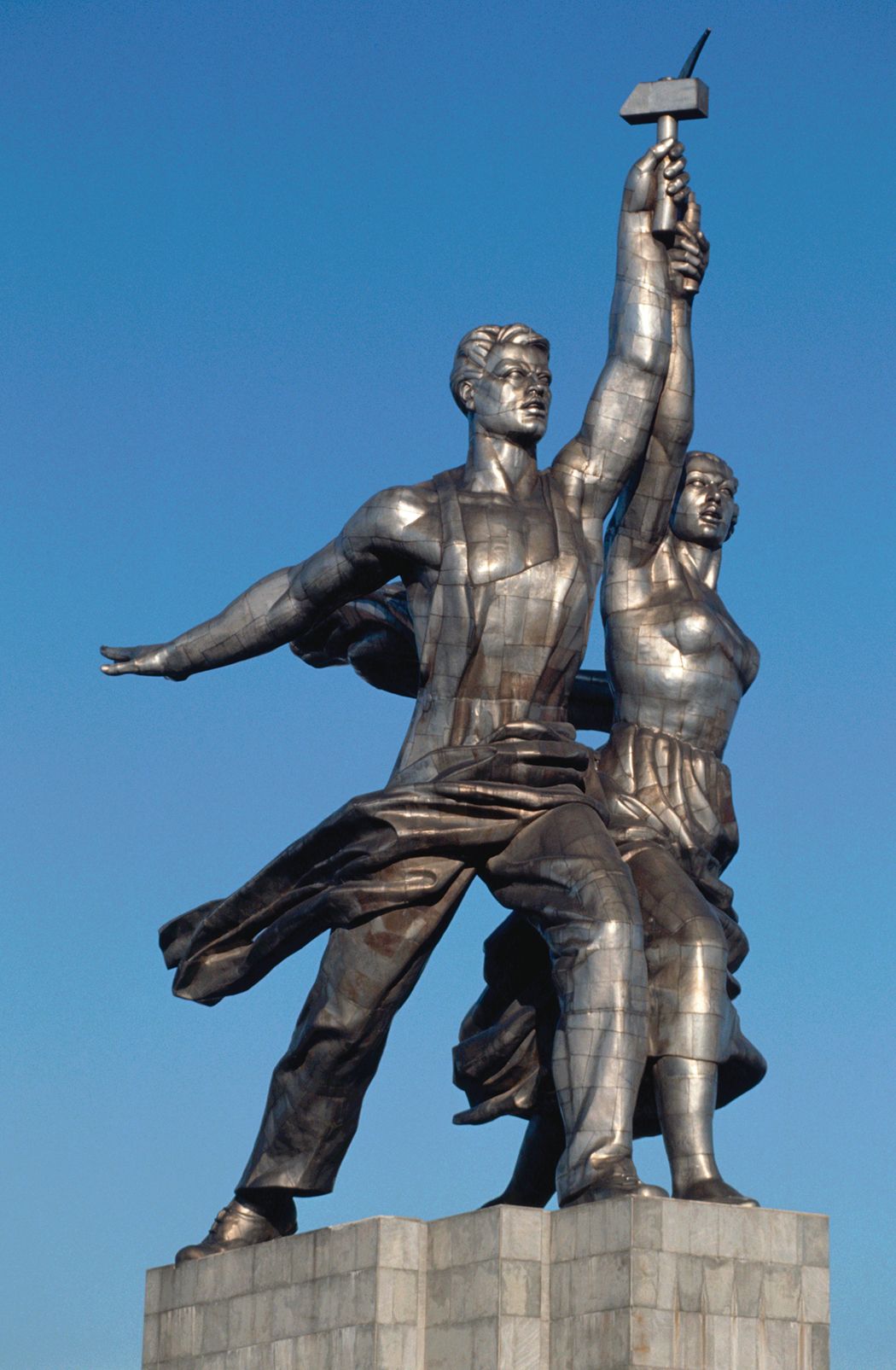
Finally, as a post-script to this messy brief write-up, here's a short poem/set of song lyrics, which we've translationally-composed from an other, older set of song lyrics.
ART OF STONE MONUMENTS
(After the lyrics to "Искусство Каменных Статуй” by Deadushki)
(Translated to Worldish + mildly detourned/updated by A.C.T. Soon®)
Rolling on over me again, old stranger night is here,
Gardens of my hermeticism
someone had sown with fear,
Yesterday's runner up was shot
next to a wall
by dawn,
Buried in tabloid basement jails,
Mourned by a songbird flown.
Those who survive learn how to sleep, saved for a span of time,
But I know: time must run out
when
dreams start to run inside.
There is an art of enormous forms:
Statues devised from slabs.
It is an art form of timeless stone:
Art of stone monuments.
Raining on gardens where I’m alone, raindrops still hunt in gangs,
But they shall never imbibe the full
art of stone monuments!
I am much stronger than the hunt,
Sharpest of arrows bounce,
Once this lone wolf, transformed to stone,
Forever stands and laughs.
Those who survive learn how to sleep, saved for a span of time,
Now I’ve learned: time might help us
where
dreams start to run inside.
There is an art of enormous forms:
Statues devised from slabs.
It is an art form of timeless stone:
Art of stone monuments.
Various sculptures & designs at the Mukhina museum in Theodosia:
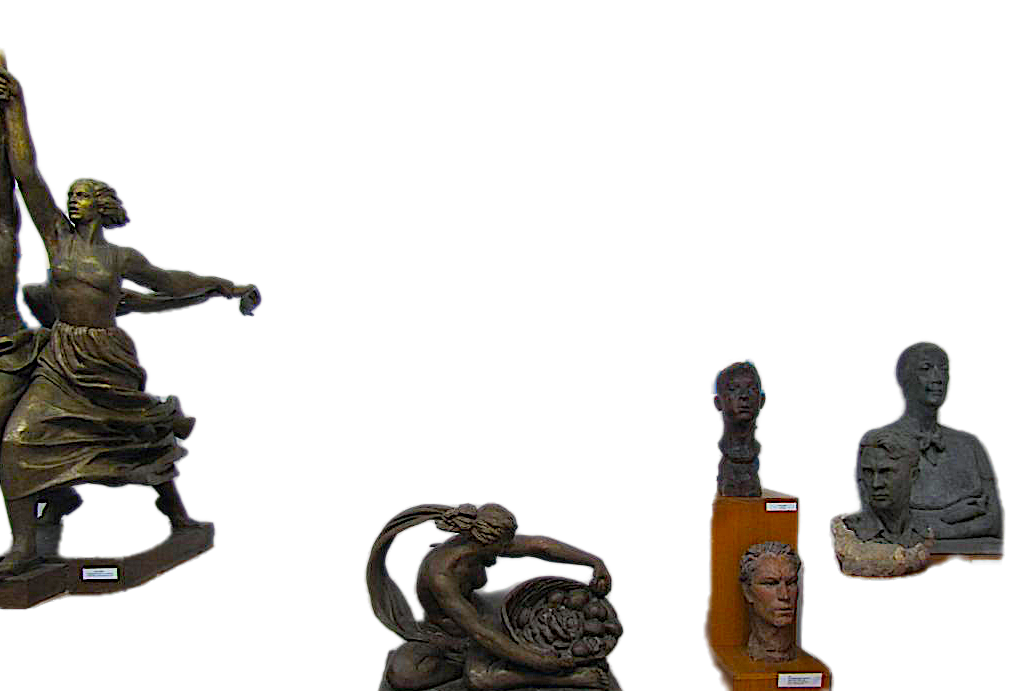
Use it with the 🧨 diffusers library
from diffusers import AutoPipelineForText2Image
import torch
pipeline = AutoPipelineForText2Image.from_pretrained('black-forest-labs/FLUX.1-dev', torch_dtype=torch.float16).to('cuda')
pipeline.load_lora_weights('AlekseyCalvin/Art_of_Stone_Monuments_FLUXLoRA_BySilverAgePoets', weight_name='mukhinastyle_700_lora_f16Convert.safetensors')
image = pipeline('your prompt').images[0]
For more details, including weighting, merging and fusing LoRAs, check the documentation on loading LoRAs in diffusers
- Downloads last month
- 48
Model tree for AlekseyCalvin/Art_of_Stone_Monuments_FLUXLoRA_BySilverAgePoets
Base model
black-forest-labs/FLUX.1-dev